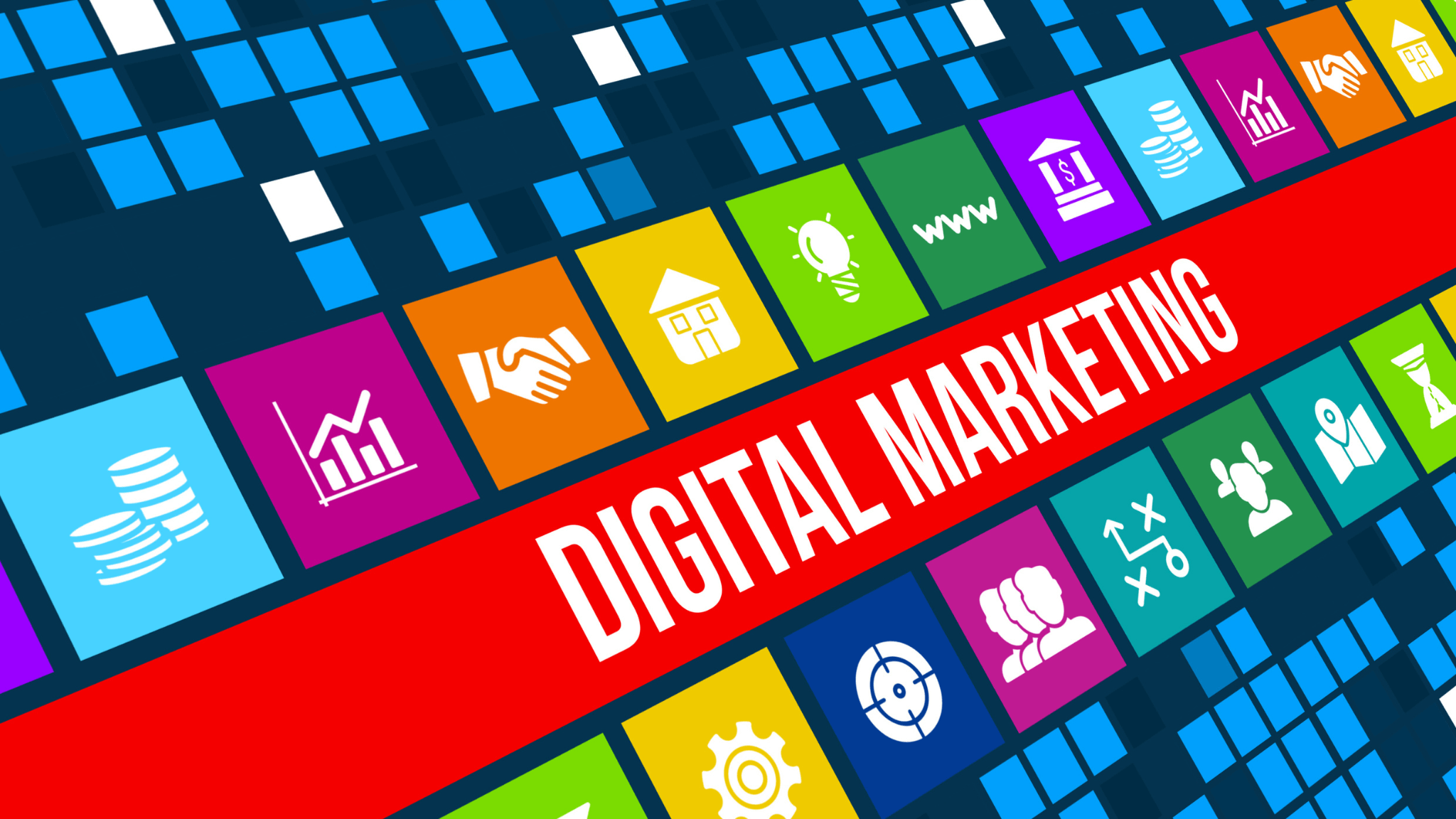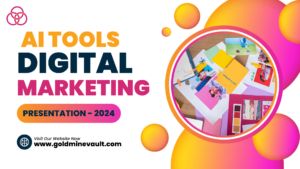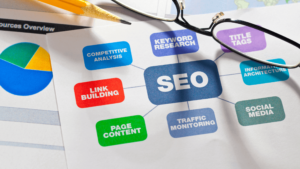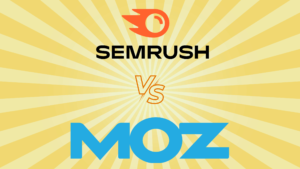Step into the future with AI tools for digital marketing, your secret weapon in the relentless battle to attract customers in this rapidly changing digital world. We understand the frustration of feeling left behind, the challenge of keeping up with trends that shift quicker than the tides. You’re not alone in this journey. With AI, you can navigate these turbulent waters, transforming obstacles into opportunities for growth and connection. Let’s harness the power of AI together, turning the tide in your favor and setting your brand apart in a crowded digital landscape.
Table of Contents
The Digital Marketing Revolution
In the dynamic world of digital marketing, we are witnessing a revolution that is reshaping the landscape at an unprecedented pace. This revolution is powered by AI tools for digital marketing, a transformative force that is not only changing the game but also setting new rules for success. As we navigate through this revolution, it’s essential to understand that the challenges of attracting customers in this fast-evolving digital marketing trend are not insurmountable. Instead, they present an opportunity to leverage the latest trends, tools, and technologies to stay ahead of the curve. Let’s dive into how the digital marketing revolution, fueled by AI tools, is offering practical solutions, innovative strategies, and a roadmap to success for those ready to embrace change.
Unveiling the Revolution: AI Tools in Digital Marketing
The core of the digital marketing revolution lies in the power of AI tools. These tools are revolutionizing the way we understand our audience, automate processes, and personalize experiences at scale. From chatbots that deliver instant customer service to algorithms that predict buying behaviors, AI is enabling marketers to achieve what was once thought impossible. The key to harnessing the power of AI lies in understanding its capabilities and integrating these tools strategically into your marketing efforts.
Transforming Challenges into Opportunities
For individuals struggling to attract customers, AI tools for digital marketing offer a beacon of hope. The revolution is not just about adopting new technologies but about transforming your approach to digital marketing. By leveraging AI, you can gain deeper insights into your audience, automate time-consuming tasks, and deliver personalized content that resonates with your target market. This strategic integration of AI tools can turn the challenge of attracting customers into an opportunity to engage and convert your audience like never before.
Practical Advice for Navigating the Revolution
- Start with Strategy: Before diving into AI tools, define your marketing goals and challenges. This strategic approach ensures that you choose AI solutions that align with your objectives, offering the best return on investment.
- Embrace Personalization: Use AI tools to deliver personalized experiences at every touchpoint. Personalization is no longer a luxury but a necessity in attracting and retaining customers.
- Optimize with AI: From SEO to content marketing, AI tools offer insights and automation that can drastically improve your marketing efficiency. Use these tools to optimize your campaigns and measure their performance in real-time.
- Stay Informed and Adapt: The digital marketing landscape is continually evolving. Stay informed about the latest AI tools and trends by following industry leaders and participating in digital marketing forums.
The Path Forward
The digital marketing revolution, powered by AI tools, is here to stay. By embracing these tools, you not only overcome the challenges of attracting customers but also set a new standard for excellence in digital marketing. The future belongs to those who are ready to adapt, innovate, and lead in this exciting era of digital transformation. Let’s embark on this journey together, leveraging the power of AI to unlock new possibilities and drive unprecedented success in digital marketing.
The digital marketing revolution offers a unique opportunity to redefine how we connect with our audience. By integrating AI tools for digital marketing into our strategies, we can transform challenges into victories, navigating the fast-evolving trends with confidence and creativity. The time to act is now, to embrace the revolution and shape the future of digital marketing.
Introduction: The AI Revolution in Digital Marketing
If there’s one truth in the world of digital marketing, it’s that change is the only constant. But even by those standards, we’re witnessing a seismic shift that’s redefining how we engage, interact, and convert our audience into loyal customers. This monumental change is powered by the AI revolution in digital marketing. As someone deeply entrenched in the digital marketing landscape, I’ve seen firsthand the transformative power of AI tools for digital marketing. Today, I want to share with you not just the essence of this revolution but how you can harness its potential to overcome the challenge of attracting customers in this fast-paced digital era.

The Dawn of the AI Revolution in Digital Marketing
Artificial Intelligence (AI) is not just a buzzword or a futuristic fantasy; it’s a present reality reshaping the digital marketing landscape. From small startups to giant corporations, businesses are leveraging AI tools to gain an unprecedented edge. The reason? AI tools offer smarter, more efficient ways to connect with customers, analyze data, and optimize marketing strategies.
Why AI Tools Are Game Changers
AI tools for digital marketing are game changers because they bring precision, personalization, and efficiency to the table. They sift through data at lightning speed, uncover insights that would take humans hours to analyze, and automate tasks that previously consumed a significant chunk of our time. This means we can now craft marketing campaigns that are not only highly targeted but also incredibly adaptive to the changing preferences of our audience.
The Impact of AI on Digital Marketing
The impact of AI on digital marketing is profound:
- Personalized Customer Experiences: AI enables hyper-personalization, allowing marketers to create user experiences that resonate on an individual level.
- Enhanced Decision Making: With AI’s data analysis capabilities, marketers can make informed decisions, predicting trends and customer behaviors with remarkable accuracy.
- Automated Content Creation: AI tools can generate content, from email marketing copy to blog posts, that is both relevant and engaging to your target audience.
- Improved SEO Strategies: AI tools analyze search trends and user behavior, providing insights that help optimize content for better search engine rankings.
Leveraging AI Tools for Digital Marketing Success
To truly leverage AI tools for digital marketing success, start by identifying the areas in your marketing strategy that can benefit the most from automation and personalization. Experiment with different AI tools to see which ones align best with your goals. Remember, the key to success in digital marketing is not just adopting new technologies but integrating them in a way that adds real value to your customer’s journey.
Staying Ahead in the Fast-Evolving Digital Landscape
The digital marketing landscape is evolving at an unprecedented pace, driven by new technologies and changing consumer behaviors. To stay ahead, it’s crucial to keep abreast of the latest AI tools and trends. Subscribe to industry blogs, attend webinars, and participate in forums where the future of digital marketing is discussed.
Understanding AI in the Marketing Ecosystem
In the intricate dance of digital marketing, where every step, every move counts, understanding AI’s role in the marketing ecosystem is akin to discovering a secret rhythm that can transform an ordinary campaign into an extraordinary symphony of engagement and conversion. As we dive into the world of AI tools for digital marketing, let’s demystify this complex landscape and unveil how these tools can be the lifeline for businesses struggling to captivate their audience.
The Essence of AI in Digital Marketing
At its core, AI in digital marketing is about leveraging intelligent technology to make more informed decisions, automate repetitive tasks, and create more personalized experiences for your audience. But it’s much more than just automation and algorithms; it’s about understanding your audience at a granular level, predicting market trends, and delivering content that resonates on a personal level.
Why AI Tools are Indispensable in Today’s Marketing Ecosystem
AI tools for digital marketing are not just add-ons or nice-to-haves; they’ve become indispensable. In a landscape where consumer behaviors shift as swiftly as the tides, AI tools provide the agility and insights needed to stay ahead. They analyze vast amounts of data in real-time, offering predictions and actionable insights that human marketers could never process at the same speed or scale. This means you can tailor your marketing strategies with a precision that was previously unimaginable.
The Multifaceted Role of AI in Marketing
- Personalization: AI excels in breaking down data to offer personalized marketing at scale. From personalized email marketing campaigns to customized product recommendations on your website, AI tools ensure that your messaging hits the mark every time.
- Customer Insights: Understanding your audience is paramount, and AI tools for digital marketing provide deep insights into customer behaviors, preferences, and pain points. This allows you to craft strategies that are not just reactive but proactive.
- Content Optimization: AI doesn’t just analyze data; it can also help create and optimize content. From generating blog post topics that are likely to engage your audience to optimizing your site’s content for SEO, AI tools make content marketing both efficient and effective.
- Predictive Analysis: One of AI’s most compelling uses in digital marketing is its ability to predict future trends. This can range from identifying emerging customer segments to forecasting changes in consumer behavior, allowing you to stay one step ahead.
Leveraging AI Tools for Maximum Impact
To truly benefit from AI in digital marketing, start with a clear understanding of your objectives. Are you looking to improve customer engagement, boost conversions, or perhaps enhance your content marketing strategy? Once your goals are clear, select AI tools that align with these objectives. Remember, the key is not to replace human creativity and empathy but to augment it with AI’s analytical power and data processing capabilities.
Staying Ahead in the Fast-Evolving Digital Marketing Landscape
The digital marketing landscape is not just evolving; it’s transforming at warp speed. To keep pace, it’s crucial to stay informed about the latest AI tools and trends. Subscribe to industry newsletters, follow thought leaders in the space, and never stop experimenting with new tools and techniques.
Understanding AI in the marketing ecosystem is your first step toward unlocking its potential to drive growth and innovation in your digital marketing efforts. In a world where attention is the most coveted currency, AI tools for digital marketing offer a way to not just capture attention but to engage and convert your audience like never before. As you navigate the complexities of digital marketing, let AI be your guide, transforming data into insights, insights into strategies, and strategies into success.
Top AI Tools Revolutionizing Digital Marketing
In the ever-evolving world of digital marketing, staying ahead means not just keeping up with trends but leveraging the very tools that redefine them. Today, we’re diving into the realm of AI tools for digital marketing, a domain where innovation meets efficiency, transforming the landscape for marketers everywhere. These tools are not just revolutionizing digital marketing; they’re reshaping how we engage, understand, and delight our customers. For businesses struggling to attract customers, these AI tools can be the game-changer you need. Let’s explore the top AI tools that are revolutionizing digital marketing, ensuring you’re equipped to thrive in this dynamic environment.
1. Chatbots and Customer Service: Intercom and Drift
In the digital age, immediacy is key. Chatbots like Intercom and Drift use AI to provide real-time, 24/7 customer service and engagement. They can answer queries, provide personalized recommendations, and guide users through the customer journey, all without human intervention. This level of service not only enhances customer experience but also frees up your team to focus on more complex tasks.
2. Content Creation and Optimization: Jasper (formerly Jarvis) and Grammarly
Creating engaging content consistently is a challenge for many marketers. Jasper harnesses AI to generate blog posts, social media content, and even ad copy, streamlining the content creation process. Meanwhile, Grammarly uses AI to refine your writing, ensuring it’s not just grammatically correct but also engaging and tailored to your audience’s preferences.
3. Email Marketing Personalization: Mailchimp
Mailchimp uses AI to segment your audience and personalize email content, ensuring that your messages resonate with each subscriber. From optimizing send times to predicting the performance of your content, Mailchimp’s AI tools help maximize your email marketing efforts’ impact.
4. SEO and Content Strategy: SEMrush and Ahrefs
AI tools like SEMrush and Ahrefs are indispensable for SEO and content strategy. They analyze search data, track keyword rankings, and provide insights into your competitors’ strategies. With AI, these tools offer recommendations to improve your SEO and content marketing efforts, driving more traffic to your site.
5. Social Media Management and Analytics: Hootsuite and Sprout Social
Managing multiple social media channels can be daunting. AI-powered tools like Hootsuite and Sprout Social offer analytics and automated scheduling, ensuring your content reaches your audience at the optimal time. They also provide insights into engagement trends, helping you refine your social media strategy.
6. Predictive Analytics and Customer Insights: HubSpot and Salesforce
Understanding your customer is the cornerstone of effective marketing. HubSpot and Salesforce use AI to analyze customer data, providing predictive insights that can guide your marketing strategy. From identifying potential leads to personalizing the customer journey, these tools offer a comprehensive view of your audience.
7. Visual Content Creation: Canva
With Canva’s AI-driven design suggestions and templates, creating visually stunning content has never been easier. Whether you’re designing social media graphics, presentations, or marketing materials, Canva’s AI tools help ensure your visuals stand out.
In a world where digital marketing trends shift with the wind, AI tools offer a beacon of stability, efficiency, and personalization. By embracing these AI tools for digital marketing, businesses can not only attract but also retain customers more effectively, staying ahead in the competitive digital landscape. Remember, the key to leveraging these tools isn’t just in their adoption but in their strategic integration into your marketing efforts. As we navigate the digital marketing future, these AI tools will undoubtedly play a pivotal role in shaping successful, dynamic strategies that resonate with customers on a deeper level.
Personalization at Scale: How AI is Changing the Game
In the digital marketing arena, the quest to capture the ever-elusive attention of customers has led to the birth of a revolutionary strategy: personalization at scale. Thanks to the advent of AI tools for digital marketing, personalizing customer experiences is no longer a Herculean task reserved for the tech giants. It’s now within reach for businesses of all sizes, transforming the way we engage, convert, and retain customers. Let’s dive deep into how AI is changing the game and why mastering personalization at scale could be your golden ticket in the fast-evolving digital marketing landscape.
The Power of Personalization
At its core, personalization means delivering the right message, to the right person, at the right time. It’s about understanding your customers’ needs, preferences, and behaviors so intimately that every interaction feels tailor-made. But here’s the catch: achieving this level of personalization manually is virtually impossible, especially at scale. Enter AI tools for digital marketing, the game-changers that are making personalization at scale not just possible, but profitable.
AI Tools: The Architects of Personalization
AI tools leverage machine learning and data analytics to sift through mountains of customer data, identifying patterns, preferences, and potential opportunities for engagement. These tools can automate personalized email campaigns, tailor product recommendations on your website, or even predict future purchase behaviors. The result? A customer experience so seamless and personalized that it dramatically boosts engagement and conversion rates.
Implementing AI for Maximum Impact
- Data is Your Foundation: The first step in leveraging AI for personalization is to ensure you’re collecting the right data. This includes behavioral data, purchase history, and even social media interactions. The more data you have, the more precise your AI tools can be in crafting personalized experiences.
- Choose Your Tools Wisely: Not all AI tools are created equal. Select tools that integrate well with your existing platforms and offer the specific features you need, whether that’s email personalization, content optimization, or predictive analytics.
- Test, Learn, and Adapt: Personalization is not a set-it-and-forget-it strategy. Use A/B testing to see what works best, and be prepared to continually adapt your approach based on the insights your AI tools provide.
The Benefits of Personalization at Scale
- Increased Customer Loyalty: Personalized experiences make customers feel valued, increasing loyalty and lifetime value.
- Higher Conversion Rates: Tailoring your marketing messages increases relevance, which in turn boosts conversion rates.
- Efficiency at Scale: AI automates the personalization process, allowing you to reach more customers more effectively than ever before.
Overcoming Challenges
While the benefits are clear, implementing personalization at scale is not without its challenges. Data privacy concerns, the need for constant optimization, and the potential for personalization fatigue are all hurdles that businesses need to navigate carefully. However, with the right strategy and tools, these challenges can be overcome, paving the way for a more personalized, customer-centric marketing approach.

The Future is Personalized
As we look to the future, it’s clear that personalization will continue to be a critical driver of digital marketing success. AI tools for digital marketing are not just enabling personalization at scale; they’re setting a new standard for how businesses engage with their customers. For those struggling to attract and retain customers in this competitive landscape, embracing AI-driven personalization could well be the key to unlocking unprecedented growth and loyalty.
Personalization at scale is revolutionizing digital marketing, and AI tools are at the heart of this transformation. By harnessing the power of AI, businesses can deliver personalized experiences that resonate with their audience, fostering loyalty and driving conversions. The journey to personalization may require a shift in mindset and strategy, but the rewards are well worth the effort. In the ever-evolving world of digital marketing, personalization isn’t just an advantage; it’s becoming a necessity.
Content Creation and Optimization with AI
In today’s digital marketing landscape, the race to capture attention and convert leads into loyal customers is more intense than ever. But there’s a game-changer that’s reshaping the battleground, giving savvy marketers an edge in crafting content that not only captivates but converts. That game-changer? AI tools for digital marketing. As we delve into the world of content creation and optimization with AI, we’re not just exploring new tools; we’re unlocking a new era of marketing efficiency and effectiveness.
Revolutionizing Content Creation with AI
Creating content that resonates with your audience is both an art and a science. AI tools for digital marketing are transforming this process by making it smarter, faster, and more personalized. Imagine having an assistant that can generate blog topics that are guaranteed to engage your audience, write draft copies, suggest improvements, and even predict the performance of your content before it goes live. Tools like Jasper (formerly Jarvis) and Copy.ai are leading this charge, leveraging natural language processing to produce content that’s not just high-quality but deeply aligned with your audience’s interests and search behaviors.
The New Frontier of Content Optimization
Optimization is where AI truly shines, taking the guesswork out of SEO and engagement strategies. AI-powered tools analyze vast amounts of data to uncover what works (and what doesn’t), offering actionable insights to elevate your content strategy. From identifying the right keywords to suggesting content structures that are more likely to rank in search engines, AI tools like Clearscope and MarketMuse provide a roadmap for creating content that not only ranks but resonates.
How to Harness AI Tools for Digital Marketing Success
- Set Clear Goals: Define what success looks like for your content. Whether it’s driving traffic, boosting engagement, or generating leads, having clear objectives will guide you in choosing the right AI tools.
- Select the Right Tools: Not all AI tools are created equal. Evaluate tools based on their features, ease of use, and how well they integrate with your current tech stack. Start with one or two tools that best match your immediate needs.
- Embrace Data-Driven Insights: Use AI tools to gather insights on your audience’s preferences and behaviors. These insights can help tailor your content strategy to better meet your audience’s needs.
- Optimize and Experiment: Leverage AI for SEO optimization, but don’t stop there. Experiment with different content formats and strategies, using AI to analyze performance and guide your iterations.
- Balance AI with Human Creativity: While AI can provide powerful insights and automate certain tasks, the creative and emotional connection with your audience still requires a human touch. Use AI as a tool to enhance, not replace, your creativity.
Overcoming Challenges
Integrating AI into your digital marketing strategy doesn’t come without its challenges. Data privacy, maintaining brand voice, and ensuring content authenticity are valid concerns. However, by setting clear guidelines, regularly reviewing AI-generated content, and staying informed about AI advancements, you can navigate these challenges successfully.
The Future is Now
AI tools for digital marketing are not just futuristic gadgets; they’re here, transforming how we create and optimize content. For marketers struggling to attract customers in a fast-evolving digital landscape, AI offers a beacon of hope and a path to success. By integrating AI into your content strategy, you can stay ahead of trends, engage your audience more effectively, and achieve your marketing objectives with unprecedented precision.
In the end, the fusion of AI with human creativity and strategic insight forms the ultimate marketing toolkit. As we move forward, the question isn’t whether AI will be a part of digital marketing’s future—it’s how quickly we can adapt and thrive in this new AI-driven era.
Improving SEO with AI Tools
In the dynamic world of digital marketing, SEO stands as the backbone of online visibility and success. However, as search engine algorithms become more sophisticated, so must our strategies for ranking and visibility. Enter the realm of AI tools for digital marketing, a groundbreaking evolution that is reshaping the SEO landscape. These tools aren’t just changing the game; they’re creating a whole new playing field where precision, efficiency, and insight lead to unprecedented success. Let’s dive into how AI is revolutionizing SEO and how you can harness its power to not only survive but thrive in today’s competitive digital ecosystem.
The AI Revolution in SEO
AI tools for digital marketing are transforming SEO from a hit-or-miss endeavor into a data-driven science. These tools leverage machine learning and natural language processing to analyze search patterns, understand user intent, and predict future trends. This means we can now optimize our content and strategies with a level of precision previously unattainable.
Harnessing AI for Keyword Research and Content Optimization
Keyword research and content optimization are at the heart of SEO. AI tools such as MarketMuse and Clearscope offer an advanced analysis of your content in comparison to top-ranking competitors, suggesting specific keywords and topics you should be targeting. They go beyond simple keyword density, evaluating the relevancy and context of your content to ensure it aligns with user intent and search engine criteria.
AI-Driven Technical SEO Audits
Technical SEO can be complex and time-consuming, but AI tools like DeepCrawl and Screaming Frog are changing that narrative. These tools can crawl your website, identifying issues such as broken links, poor mobile optimization, and slow page speeds that could be hurting your rankings. They provide actionable insights and recommendations, making it easier to prioritize and address technical SEO challenges.
Personalizing User Experience with AI
User experience is a critical factor in SEO rankings. AI tools help create personalized website experiences for visitors, significantly improving engagement metrics like time on site and bounce rate. Tools like Optimizely use AI to conduct A/B testing at scale, determining which website layouts, content, and features resonate best with your audience, thus indirectly boosting your SEO by enhancing user satisfaction.
Predictive Analytics for SEO Strategy
Predictive analytics is where AI truly shines, allowing marketers to forecast future trends and adjust their SEO strategies accordingly. Tools like SEMrush’s Keyword Magic Tool use AI to analyze search data, providing insights into emerging search trends and keyword opportunities. This foresight enables marketers to create content that meets the audience’s needs before they even express them, positioning your brand as a thought leader in your niche.
Implementing AI in Your SEO Strategy
- Start with a Clear Goal: Define what you want to achieve with your SEO efforts—whether it’s increasing organic traffic, improving keyword rankings, or boosting conversions.
- Choose the Right AI Tools: Not all AI tools are created equal. Select those that align with your goals and integrate seamlessly with your current digital marketing stack.
- Analyze and Optimize Continuously: Use AI to continuously monitor your SEO performance and user engagement. Leverage the insights to optimize your content and technical SEO elements regularly.
- Stay Informed: The AI and SEO landscapes are constantly evolving. Keep yourself informed about the latest trends, tools, and technologies to ensure your strategies remain effective.
The integration of AI tools into SEO strategies represents a monumental shift in digital marketing. For those struggling to attract customers and stay ahead in the fast-evolving digital marketing trends, AI offers a pathway to enhanced visibility, engagement, and ultimately, conversion. By embracing AI tools for digital marketing, you’re not just optimizing your SEO; you’re setting the foundation for a more data-driven, efficient, and successful marketing strategy that resonates with your target audience and stands the test of time. Welcome to the future of SEO, where AI leads the way to greater visibility and success.
Leveraging AI for Enhanced Customer Experience
In today’s digital age, where every click, like, and scroll tells a story, understanding and enhancing the customer experience has become paramount for businesses looking to thrive. Amidst the fast-evolving digital marketing landscape, one trend stands out as a beacon of innovation and personalization: leveraging AI tools for digital marketing to enhance the customer experience. This isn’t just about staying ahead of the curve; it’s about redefining the curve itself.
The Transformation of Customer Experience with AI
AI has ushered in a new era where personalized customer experiences are not just appreciated but expected. AI tools for digital marketing are at the forefront of this transformation, offering businesses unprecedented opportunities to engage with customers on a deeper level. By analyzing data in real-time, AI can predict customer behavior, tailor content to individual preferences, and even anticipate needs before they arise. This level of personalization doesn’t just enhance the customer experience; it elevates it.
How AI Tools Are Enhancing Customer Experiences
- Personalized Content Creation: AI-driven platforms can generate content that resonates with individual users, from personalized email marketing campaigns to tailored website content, ensuring that every interaction feels unique and relevant.
- Chatbots and Virtual Assistants: AI-powered chatbots provide instant, 24/7 assistance to customers, answering queries, offering recommendations, and even solving problems in real-time. This not only improves customer satisfaction but also frees up human resources to tackle more complex issues.
- Predictive Analytics for Better Engagement: By analyzing customer data, AI tools can predict future behaviors and preferences, allowing businesses to craft marketing strategies that are several steps ahead. This anticipatory approach ensures that customers receive the right message at the right time, significantly enhancing engagement and loyalty.
- Seamless Omnichannel Experiences: AI tools integrate data across various channels to provide a cohesive and seamless customer experience, whether the customer is interacting with your brand on social media, your website, or in a physical store.
Implementing AI for a Superior Customer Experience
- Understand Your Customers’ Journey: Map out the customer journey to identify key touchpoints where AI can enhance the experience. Understanding the path from discovery to purchase and beyond is crucial in determining where to implement AI tools.
- Choose the Right AI Tools: Not all AI tools are suited for every business. Select tools that align with your specific goals, whether it’s improving customer service, personalizing marketing messages, or analyzing customer behavior.
- Test and Iterate: Implementing AI is not a set-it-and-forget-it process. Continuously test different AI strategies and tools, gather feedback, and iterate to improve the customer experience constantly.
- Prioritize Privacy and Transparency: While leveraging AI to enhance customer experiences, it’s essential to prioritize data privacy and be transparent with customers about how their data is being used.
In the rapidly changing world of digital marketing, AI tools offer a powerful means to not only keep pace but to lead the charge in providing enhanced customer experiences. By personalizing interactions, predicting behaviors, and streamlining the customer journey, AI allows businesses to connect with their audience in more meaningful ways. For those struggling to attract and retain customers, embracing AI tools for digital marketing could be the key to unlocking unparalleled levels of engagement and loyalty. As we move forward, the businesses that succeed will be those that view AI not just as a tool, but as an integral part of their strategy to understand and delight their customers at every turn.
AI and Data Analytics: Making Sense of Customer Insights
In the vast ocean of digital marketing, where every click and scroll leaves a digital footprint, understanding your customers has never been more crucial. Yet, as the data multiplies and the trends shift at breakneck speed, making sense of customer insights can feel like searching for a needle in a haystack. This is where AI tools for digital marketing come into play, transforming the daunting task of data analysis into a streamlined, insightful process. Let’s dive into how AI and data analytics are revolutionizing the way we gather, interpret, and act on customer insights, ensuring that businesses not only keep pace with the evolving digital marketing trends but also stay several steps ahead.
The Role of AI in Data Analytics
AI tools for digital marketing are not just about automating tasks; they’re about unlocking the full potential of your data. These tools leverage machine learning algorithms to sift through vast amounts of information, identifying patterns, behaviors, and preferences that might go unnoticed by the human eye. This level of analysis allows marketers to understand their audience on a deeper level, predicting future behaviors and tailoring strategies to meet the ever-changing demands of the market.
Transforming Data into Actionable Insights
The true power of AI in data analytics lies in its ability to turn raw data into actionable insights. For instance, AI can analyze customer interaction data to pinpoint which content formats drive the most engagement, or it can identify the most effective channels for reaching your target audience. These insights enable marketers to make informed decisions, optimizing their strategies for maximum impact and ROI.
Personalization at Scale
One of the most significant advantages of using AI tools for digital marketing is the ability to personalize marketing efforts at scale. By understanding individual customer behaviors and preferences, AI can help tailor content, offers, and messages to match. This level of personalization enhances the customer experience, boosts engagement, and, ultimately, drives conversions.
Predictive Analytics: Anticipating Customer Needs
Predictive analytics is another area where AI shines, allowing businesses to anticipate customer needs and trends before they become apparent. By analyzing past behaviors, AI can forecast future actions, enabling marketers to create strategies that address customer needs proactively. This forward-thinking approach not only sets businesses apart from their competitors but also fosters a sense of loyalty and trust among customers.
Implementing AI Tools for Enhanced Data Analytics
- Start with a Clear Objective: Define what you want to achieve with your data analytics efforts. Whether it’s improving customer retention, increasing conversions, or enhancing personalization, having a clear goal will guide your use of AI tools.
- Choose the Right Tools: There’s a plethora of AI tools available, but not all will be relevant to your needs. Research and select tools that offer the features and capabilities that align with your marketing objectives.
- Integrate AI with Your Existing Data: To get the most out of AI, ensure it’s fully integrated with your existing data sources. This seamless integration will provide a more comprehensive view of your customers and enable more accurate insights.
- Test, Learn, and Adapt: The digital marketing landscape is continually evolving, and so should your strategies. Use the insights gained from AI to test new approaches, learn from the outcomes, and adapt your strategies accordingly.
In the ever-changing world of digital marketing, staying informed and agile is key to attracting and retaining customers. AI tools for digital marketing offer a powerful solution, turning the complex web of customer data into clear, actionable insights. By leveraging AI and data analytics, businesses can gain a deeper understanding of their audience, personalize their marketing efforts, and anticipate future trends. This strategic use of technology not only enhances the customer experience but also sets the stage for sustained growth and success in the digital arena.
Navigating the Challenges of Implementing AI
Embarking on the journey of integrating AI tools into your digital marketing strategy is like setting sail into uncharted waters. It’s thrilling, full of potential, but not without its challenges. As we navigate through the complexities of implementing AI in the digital marketing sphere, it’s crucial to have a compass that guides you towards successful integration and utilization. Today, we’re diving deep into how to overcome the hurdles that come with implementing AI tools for digital marketing, ensuring that your voyage is not just fruitful but transformative.
Understanding the Landscape
Before we tackle the challenges, let’s understand the terrain. AI tools for digital marketing offer unprecedented advantages, from automating mundane tasks and personalizing customer experiences to providing insightful analytics and enhancing SEO strategies. However, integrating these tools into your existing systems and workflows can present obstacles that may seem daunting at first glance.
Challenge 1: Overcoming the Learning Curve
Solution: Education is key. Begin by familiarizing yourself and your team with AI fundamentals. Invest in training sessions, webinars, and workshops. Many AI tool providers offer comprehensive learning resources designed to ease the integration process. Remember, proficiency in AI doesn’t happen overnight, but with persistent learning, the fog will clear, revealing new possibilities for your marketing strategies.
Challenge 2: Data Privacy and Security Concerns
Solution: With great power comes great responsibility. Implementing AI tools requires handling vast amounts of data, raising legitimate concerns about privacy and security. Address these by choosing AI solutions that comply with data protection regulations like GDPR. Be transparent with your customers about how their data is being used and invest in robust security measures to protect their information.
Challenge 3: Integration with Existing Systems
Solution: Compatibility is crucial. The seamless integration of AI tools with your current digital marketing platforms ensures that you’re not building on disjointed foundations. Start with a thorough audit of your existing tools and systems. Look for AI solutions that offer flexible APIs and integration capabilities. In some cases, it may be worth considering platform upgrades or changes to ensure compatibility and maximize the benefits of AI.
Challenge 4: Ensuring ROI from AI Investments
Solution: Set clear, measurable goals. The allure of AI can be strong, but every investment should be justified by its potential return. Before diving in, define what success looks like for your AI integration. Is it increased customer engagement, higher conversion rates, or improved content personalization? Use these objectives to guide your AI tool selection and measure the impact rigorously against predefined KPIs.
Challenge 5: Maintaining the Human Touch
Solution: Balance is essential. While AI can automate and optimize many aspects of digital marketing, it’s vital to retain the human element that connects with customers on an emotional level. Use AI to enhance your strategies, not replace the creativity and empathy that only humans can provide. Let AI handle the data and analytics, freeing up your team to focus on creative, strategic initiatives that resonate with your audience.
Implementing AI tools for digital marketing is a journey rife with challenges, but with the right strategies, these obstacles become stepping stones to innovation and growth. By educating your team, ensuring data privacy, integrating AI seamlessly with existing systems, setting clear ROI goals, and maintaining the human touch, you can navigate the complexities of AI integration with confidence. The future of digital marketing is bright with the promise of AI, and by overcoming these challenges, you position your business not just to succeed but to lead in the fast-evolving digital landscape.
FAQs: Addressing Common Concerns About AI in Marketing
In the rapidly evolving world of digital marketing, AI tools have emerged as a beacon of innovation, driving efficiency, personalization, and insights like never before. However, with new technology comes new questions. Today, we’re diving into some of the most common concerns about AI in marketing, shedding light on how AI tools for digital marketing can transform challenges into opportunities for growth. Let’s navigate through these FAQs to demystify AI and empower you to leverage its full potential in your digital marketing strategies.
FAQ 1: Is AI too complex for small businesses to implement?
Absolutely not. While AI might seem daunting at first, AI tools for digital marketing are designed with user-friendliness in mind. Many platforms offer intuitive interfaces and comprehensive support to ensure businesses of all sizes can harness the power of AI. Start small, focus on one aspect of your marketing that could benefit from automation or insights, and grow your AI toolkit from there.
FAQ 2: Will AI replace human marketers?
It’s a complement, not a replacement. The goal of AI tools in digital marketing is to augment the efforts of human marketers, not to replace them. AI excels at analyzing data and identifying patterns at scale, tasks that are time-consuming for humans. This allows marketers to focus more on creative, strategic initiatives that require a human touch.
FAQ 3: How can AI improve customer engagement?
Personalization is key. AI tools can analyze individual customer behaviors, preferences, and interactions, enabling marketers to tailor content, recommendations, and messages at a personal level. This level of personalization enhances the customer experience, boosts engagement, and increases the likelihood of conversion.
FAQ 4: Is investing in AI tools for digital marketing cost-effective?
The ROI speaks for itself. While there may be upfront costs associated with implementing AI tools, the return on investment can be substantial. By automating routine tasks, optimizing ad spend, and improving targeting and personalization, AI can help reduce costs and increase revenue over time. Measure your results and adjust your strategies to ensure you’re getting the most out of your AI investment.
FAQ 5: Can AI tools help with SEO?
SEO is one of AI’s strong suits. AI tools for digital marketing can significantly enhance your SEO efforts. From keyword research and content optimization to link building and analyzing search intent, AI can provide actionable insights that improve your search engine rankings and drive organic traffic.
FAQ 6: How do I ensure data privacy when using AI in marketing?
Privacy should always be a priority. When implementing AI tools, choose platforms that adhere to data protection regulations and prioritize customer privacy. Be transparent with your audience about how their data is being used and implement robust security measures to protect that data.
FAQ 7: How do I stay ahead of the curve with AI in marketing?
Continuous learning is vital. The AI and digital marketing landscapes are constantly evolving. Stay informed by following industry leaders, attending webinars and conferences, and experimenting with new AI tools and features. Embrace a mindset of continuous improvement and be willing to adapt your strategies as new trends and technologies emerge.
Embracing AI tools for digital marketing is a journey into the future of customer engagement, efficiency, and insights. By addressing common concerns and understanding the capabilities and potential of AI, marketers can unlock new levels of success in their digital strategies. Remember, the power of AI in marketing lies in its ability to transform data into actionable insights, automate complex tasks, and personalize customer experiences at scale. With the right approach, AI can be a powerful ally in navigating the fast-evolving digital landscape and driving your business forward.
Future Trends: What’s Next for AI in Digital Marketing
As we stand on the precipice of a new era in digital marketing, it’s clear that AI is not just a fleeting trend but a foundational shift that is reshaping our industry from the ground up. With AI tools for digital marketing becoming more sophisticated and integral to our strategies, we’re not just looking at what AI is doing now but where it’s heading next. The future of AI in digital marketing promises unprecedented personalization, efficiency, and insight, transforming challenges into opportunities and setting new benchmarks for success. Let’s explore the horizon and uncover what’s next for AI in digital marketing.
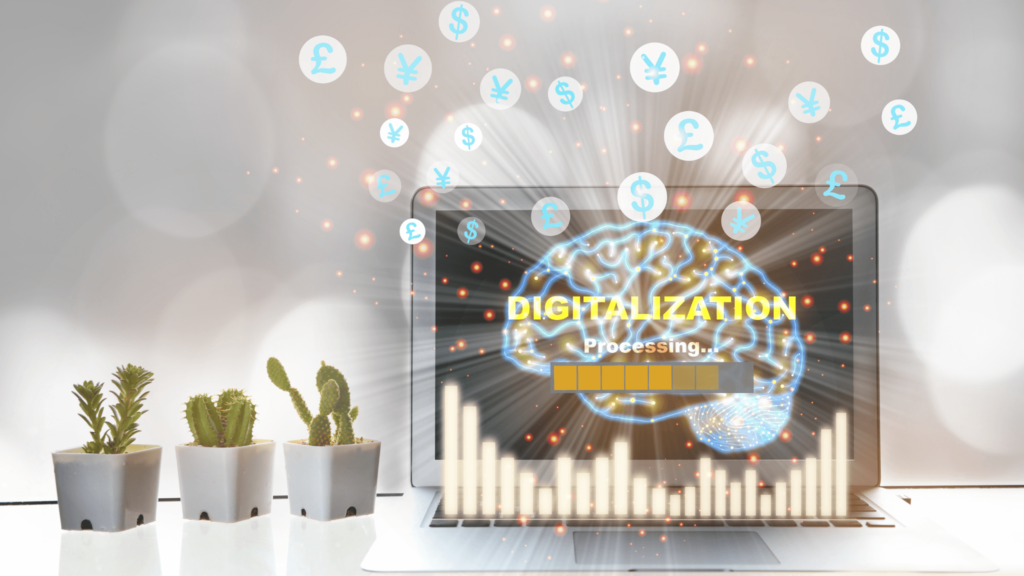
Hyper-Personalization at Scale
The future of AI in digital marketing is leading us towards hyper-personalization at an unprecedented scale. Imagine AI tools that can create entirely bespoke marketing experiences for every individual, predicting their preferences, behaviors, and even emotional states. These tools will go beyond demographics and browsing history, incorporating real-time data and predictive analytics to deliver content that resonates on a deeply personal level.
Conversational AI and Customer Service
Conversational AI, including chatbots and virtual assistants, will evolve to become even more sophisticated, offering seamless, natural interactions that mimic human conversation more closely than ever before. These AI-powered interfaces will be capable of handling complex queries, providing personalized recommendations, and even executing transactions, enhancing the customer experience and freeing up human resources for more strategic tasks.
AI-Driven Content Creation and Optimization
Content is the cornerstone of digital marketing, and AI is set to revolutionize how we create and optimize it. Future AI tools for digital marketing will not only generate high-quality, relevant content but will also be able to adapt and optimize this content in real-time based on user engagement and feedback. This means content that is not only SEO-friendly but also dynamically tailored to the audience’s evolving interests and needs.
Predictive Analytics and Decision Making
Predictive analytics is another area where AI will shine, offering marketers foresight into consumer behavior, market trends, and the ROI of marketing campaigns. These insights will allow for more strategic decision-making, enabling marketers to allocate resources more effectively, anticipate market shifts, and stay ahead of the competition.
Ethical AI and Transparency
As AI becomes more embedded in digital marketing, ethical considerations and transparency will move to the forefront. Marketers will need to navigate the balance between personalization and privacy, ensuring that AI tools are used responsibly and that customers are aware of how their data is being used. This ethical approach will be crucial in maintaining trust and building long-term relationships with customers.
The Integration of AI Across All Marketing Channels
In the future, AI will not be siloed but integrated across all digital marketing channels, from social media and email marketing to PPC and SEO. This integration will offer a cohesive, omnichannel experience that ensures consistency and maximizes the impact of marketing strategies across the board.
The future of AI in digital marketing is not just bright; it’s blazing a trail towards a new horizon of possibilities. As we look ahead, the key for marketers will be not just to adopt AI tools for digital marketing but to embrace the ongoing evolution of these technologies, continuously learning and adapting to harness their full potential. The future trends in AI promise to transform the digital marketing landscape, offering more personalized, efficient, and impactful ways to connect with customers. By staying informed and agile, we can navigate this exciting future, leveraging AI not just to meet the challenges of today but to shape the successes of tomorrow.
Getting Started with AI Tools for Your Business
Embarking on the journey of integrating AI tools into your business can feel like navigating a labyrinth of endless possibilities and challenges. However, in the realm of digital marketing, AI tools are not just a luxury; they’re becoming a necessity for staying competitive and meeting the ever-evolving needs of customers. Today, we’re diving deep into how you can get started with AI tools for digital marketing, ensuring that your business not only keeps pace with the trends but sets them. Let’s break down the process into actionable steps, making the complex simple and the overwhelming manageable.

Step 1: Define Your Objectives
Before you dive into the vast ocean of AI tools for digital marketing, it’s crucial to anchor yourself with clear objectives. What do you hope to achieve? Whether it’s enhancing customer experience, improving your SEO, personalizing your marketing campaigns, or automating repetitive tasks, having a clear understanding of your goals will guide you in selecting the right AI tools for your business.
Step 2: Assess Your Current Capabilities
Take a thorough inventory of your current digital marketing strategies and tools. Understanding where you stand will help you identify the gaps that AI can fill. This assessment will not only highlight areas for improvement but also areas where AI can amplify your existing strengths.
Step 3: Research and Select AI Tools
With your objectives in hand and a clear understanding of your current capabilities, it’s time to explore the AI tools available. Focus on tools that align with your specific goals and have proven efficacy in the digital marketing realm. Look for platforms that offer scalability, user-friendly interfaces, and robust support. Remember, the best AI tools for digital marketing are those that integrate seamlessly with your existing operations while pushing the boundaries of what’s possible.
Step 4: Start Small and Scale
The world of AI might be vast, but diving in doesn’t mean overhauling your entire digital marketing strategy overnight. Start small by implementing one or two AI tools that address your most immediate needs or offer the quickest wins. This approach allows you to measure the impact of AI on your operations and customer engagement, providing valuable insights as you plan to scale your AI integration.
Step 5: Monitor, Measure, and Optimize
As with any digital marketing strategy, the key to success with AI tools lies in continuous monitoring, measuring, and optimization. Set up metrics to evaluate the performance of the AI tools you’ve implemented, keeping an eye on ROI, customer engagement, and other key indicators of success. Use these insights to refine your approach, making adjustments as needed to ensure that your AI tools are effectively contributing to your digital marketing goals.
Step 6: Stay Informed and Adapt
The landscape of AI in digital marketing is continuously evolving, with new tools, trends, and best practices emerging regularly. Stay informed by following industry leaders, attending webinars and conferences, and participating in online forums. The willingness to learn and adapt is what will ultimately differentiate the leaders from the followers in the digital marketing realm.
Getting started with AI tools for your business is an exciting journey towards unlocking new levels of efficiency, personalization, and insight in your digital marketing efforts. By following these steps, you’re not just integrating technology into your operations; you’re setting the stage for transformational growth. Remember, the goal of leveraging AI tools for digital marketing is to enhance your strategies, engage your customers more deeply, and carve out a competitive edge in the fast-paced digital landscape. With the right approach, AI can be your most powerful ally in navigating the challenges and seizing the opportunities of digital marketing today.
Engage and Ask: What AI Tools Are You Curious About?
In the ever-evolving digital marketing landscape, staying ahead means not just keeping pace with current trends but anticipating the next big wave. And right now, that wave is AI — a powerful force reshaping how we engage, understand, and delight our customers online. AI tools for digital marketing are not just the future; they’re the present, transforming vast data landscapes into personalized customer journeys, making every click, every interaction, and every conversion count. Today, let’s dive into the world of AI tools for digital marketing, exploring how they can revolutionize your strategy and why your curiosity about them could be the key to unlocking unprecedented growth for your business.
The Revolution of AI in Digital Marketing
AI is revolutionizing digital marketing by automating tasks, providing insightful analytics, and enabling personalized customer experiences at scale. From chatbots that offer instant customer service to algorithms that predict the best content for engaging your audience, AI tools are changing the game. But with the vast array of options available, it’s natural to have questions, to wonder which tools can offer the best solutions for your unique challenges.
Why Your Curiosity Matters
Your curiosity about AI tools for digital marketing is more than just professional interest; it’s a critical step towards innovation and growth. By asking questions, exploring new tools, and understanding how AI can be integrated into your digital marketing strategy, you’re opening the door to new possibilities — ways to attract customers more effectively, to streamline your operations, and to create marketing campaigns that resonate deeply and drive results.
Top AI Tools Transforming Digital Marketing
As we peel back the layers of AI in digital marketing, several tools stand out for their ability to transform data into actionable insights, to automate complex processes, and to personalize marketing at an individual level:
- Chatbots and Conversational AI: Tools like Drift and Intercom are revolutionizing customer service, making it more responsive and personalized.
- Content Creation and Optimization: Platforms like Jasper (formerly Jarvis) and Grammarly are using AI to help marketers create and optimize content that truly engages.
- Predictive Analytics: Tools such as HubSpot and Salesforce are harnessing AI to predict customer behavior, enabling more targeted marketing strategies.
- SEO and Content Strategy: SEMrush and Ahrefs leverage AI to provide deeper insights into SEO and content performance, helping marketers optimize their online presence.
Engage and Ask: Your Turn
Now, I turn the floor over to you. What AI tools for digital marketing have sparked your curiosity? Are there specific challenges you’re facing that you believe AI could solve? Perhaps you’re wondering how AI can enhance your content strategy, or maybe you’re interested in the best AI tools for improving customer engagement. Whatever your questions, I invite you to engage and ask. Your curiosity is the first step towards harnessing the power of AI in your digital marketing strategy.
AI tools for digital marketing are not just a trend; they’re a transformative force, offering new ways to engage customers, optimize strategies, and drive growth. Your curiosity about these tools is the key to unlocking their potential, empowering you to stay ahead in the fast-paced world of digital marketing. As we continue to explore and implement AI in our marketing efforts, remember that the journey is as much about the questions we ask as the answers we find. So, let’s keep the conversation going. What AI tools are you curious about?
Conclusion: Embracing AI for Digital Marketing Success
As we stand at the crossroads of innovation and tradition in the digital marketing landscape, the path to success is being dramatically reshaped by the rise of artificial intelligence. AI tools for digital marketing are not just a fleeting trend; they represent a fundamental shift in how we connect with our audience, understand their needs, and deliver value that transcends the conventional boundaries of marketing. It’s clear that embracing AI is not merely an option for those looking to thrive in the digital realm—it’s an imperative.
The Unstoppable Rise of AI in Digital Marketing
The evolution of AI tools for digital marketing has been nothing short of revolutionary. With each passing day, these tools grow smarter, more intuitive, and more aligned with the core objectives of marketers everywhere: to attract, engage, and convert customers in the most efficient and effective ways possible. From predictive analytics that forecast future buying trends to chatbots that provide instant, personalized customer service, AI is redefining what it means to be successful in digital marketing.
Embracing AI for a Competitive Edge
The journey toward integrating AI into your digital marketing strategy is a journey towards unparalleled insight, automation, and personalization. By harnessing the power of AI tools, businesses can unlock new levels of performance across all facets of their marketing efforts. Whether it’s enhancing the customer experience through tailored content and interactions or optimizing campaigns in real-time for maximum ROI, AI offers a competitive edge that is becoming increasingly difficult to ignore.
Overcoming the Challenges
Embracing AI does come with its challenges, from the initial learning curve and integration hurdles to ongoing management and optimization. However, these challenges are not insurmountable. With the right approach—starting small, focusing on specific goals, and scaling over time—marketers can navigate the complexities of AI integration and unlock its full potential. Education, experimentation, and adaptation are key to leveraging AI not just as a tool, but as a transformative force in your digital marketing strategy.
The Path Forward
The path forward is clear: AI tools for digital marketing are shaping the future of how businesses connect with their customers. By embracing AI, marketers are not only staying ahead of the curve—they’re redefining it. The opportunities presented by AI are vast, but they require a willingness to learn, adapt, and innovate. The businesses that succeed in this new landscape will be those that view AI as a partner in their marketing efforts, one that offers new ways to achieve growth and success.
Conclusion
In conclusion, the integration of AI tools into digital marketing strategies represents a pivotal moment in the evolution of marketing. For those struggling to attract customers in a fast-evolving digital landscape, AI offers not just a lifeline, but a rocket ship to success. As we move forward, embracing AI will be crucial for staying relevant, competitive, and effective in our marketing efforts. The future of digital marketing is bright, and it’s powered by AI. The question is no longer if we should embrace AI for digital marketing success, but how quickly we can do so. Let’s embark on this journey together, exploring the endless possibilities that AI brings to our digital marketing arsenals.

